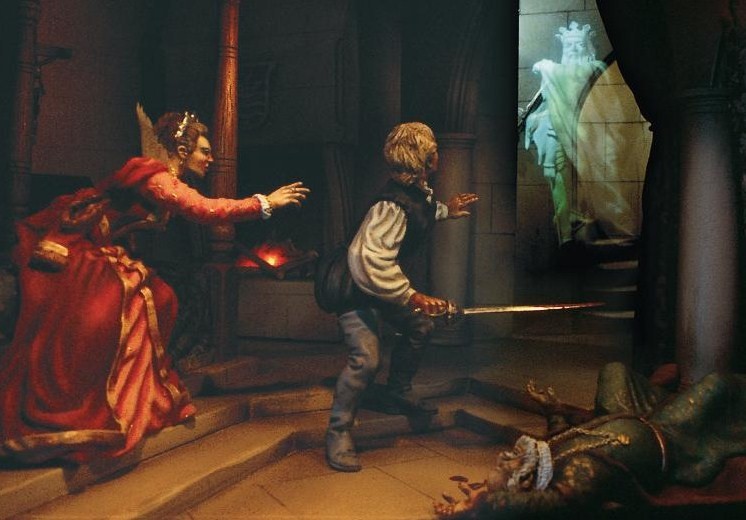
Responding to Michael Happy:
You say, Michael, “you don’t need to believe in ghosts to appreciate Hamlet.” This reminds me of something at the MLA in 1993. Walter Benn Michaels made the comment that “we no longer believe in ghosts,” then interrupted himself to say that he had just read in a newsmagazine that a majority of Americans believed in supernatural entities. He gestured around the room; “We don’t believe in ghosts,” he corrected himself.
To pursue the discussion a bit further: yes, literature creates a hypothetical world where there are ghosts, whether we “believe” in them or not. But on the other hand, Stephen Greenblatt, in Hamlet in Purgatory, shows how our reading of Hamlet is enriched by some knowledge of contemporary debates about what happens after you die. Why does the ghost of old Hamlet walk at night? What does it mean to die “Unhousel’d, disappointed, unanel’d”?
I think the point Bogdan is making, where she differs from Frye, is that literature always retains some element of reference, a centrifugal element, and that in teaching it you cannot ignore that element. Her example is to question Frye’s assertion that “the preposterous sexual ideology” of The Taming of the Shrew is “never taken very seriously.” Perhaps in an ideal world it wouldn’t be. Which is not to say that, not living in an ideal world, one shouldn’t teach the text or perform it, only to acknowledge that in certain contexts it is going to be interpreted in part in the context of what it has to say about gender relations.
One more example. Frye comments about Measure for Measure that it is simply a romantic comedy “where the chief magical device used is the bed trick instead of enchanted forests or identical twins.” This is one of those startling places where Frye just seems to me to miss something crucial. The reason that Measure for Measure has been seen as a “problem” is that there is something about the tone of it, from beginning to end, that is not really in the spirit of Shakespearean comedy. I think that here, and in the comment on Taming of the Shrew, it is Frye’s acute sense of the conventions at work that leads him to a conclusion at odds with the experience of many readers and spectators. Because although it is hypothetical, although it is centripetal, literature still does say things.
Perhaps, Michael, you see me grasping confidently for the greased pig! (By the way, your last sentence is very Bloomian, featuring both anxiety and struggle!!). But I will agree with you so far as to say that the greatness of The Tempest or Measure for Measure or Hamlet is not a function of what they reveal about Renaissance ideology. And I don’t want to become the contrarian of this blog, so I will write something more positive for my next post.

As for Measure for Measure, though, that is not all Frye has to say about the play. In very ironic comedy, as he points out, “the demonic world is never far away.” And then points out that in Measure for Measure “every male character is at one time or another threatened with death” (AC 178). Measure for Measure is no more a “problem” play for Shakespearean comedy than Tartuffe and The Misanthrope are for Moliere’s comedy, and of course Frye cites Tartuffe in the same passage as his comments on Measure for Measure. These plays are simply closer to irony and satire. The objectors to Frye’s approach want to say: oh, this is a more serious play, more referential therefore, because more realistic somehow in its tone and themes, and therefore cannot be contained by comic form, somehow complicates and breaks with it, even transcends it. Whereas Frye says, no: it is just another phase of comedy; and he seems to be right, on the evidence he provides.
Ghosts
Several of my plans have come smack up against a theory of Bardo, & I can’t help wondering if I don’t need at least a literary theory of ghosts, if not of the whole supernatural. I must start with the vampire theme in Wuthering Heights & see if I can attach it to my floating notions about the echo & the preservation of identity in DM [Daisy Miller], & of the returning ghost in Senecan revenge plays as neurotic, blocked & bound to a pattern of recurrence. The ghost theme in Eliot’s Waste Land (water-nymphs recalling the bodiless souls of Purgatory) winds up with a quotation from the Spanish Tragedy [ll. 266 ff., 432]. Also the Kurtz business, Kurtz being, like Heathcliffe, a “lost violent” soul [The Hollow Men, l. 15–16]. (Northrop Frye’s Notebooks for “Anatomy of Criticism,” CW 23, 222)
Angels
If I had been out on the hills of Bethlehem on the night of the birth of Christ, with the angels singing to the shepherds, I think that I should not have heard any angels singing. The reason why I think so is that I do not hear them now, and there is no reason to suppose that they have stopped. (The Critical Path, 114)
History tells the reader what he would have seen if he’d been present, say, at the assassination of Caesar. But what the Gospels tell us is rather something like this: if you had been present on the hills of Bethlehem in the year nothing, you might not have heard a chorus of angels. But what you would have seen and heard would have missed the whole point of what was actually going on. Thus, the antitypes of history and of prophecy as we have them in the gospel and the apocalypse give you not what you would have seen and heard, or what I would have seen and heard, but what was actually going on which we don’t have the spiritual vision to reach to. (“Kerygma,” in Northrop Frye’s Notebooks and Lectures on the Bible and Other Religious Texts, CW 13, 588)